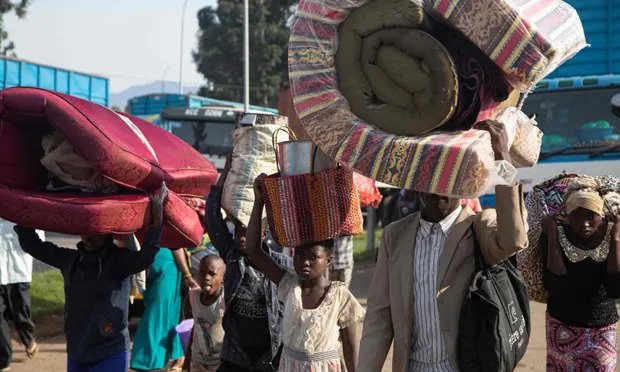As Rwandan-backed M23 rebels massacre and gang-rape in the Democratic Republic of the Congo, who will hold them to account?

The M23 rebels are perpetrating summary killings and rapes in the Democratic Republic of the Congo – and they are doing it with the backing of the regime of Rwanda’s president, Paul Kagame. That was the conclusion of Amnesty International’s investigation, released in February, into the ongoing violence against the Congolese people.
The report tells how the Mouvement du 23 Mars (M23) rebels, a group the UN says is being armed and supported by Kigali – claims denied by Kagame but supported by the US and several African and European nations – have systematically used sexual violence as a weapon to punish and humiliate its perceived enemies. The scale and brutality is shocking.
Last week, the British prime minister, Rishi Sunak, spoke to Kagame in what government advisers presented as a friendly call to discuss the UK-Rwanda “migration partnership” and “joint efforts to break the business model of criminal people smugglers and address humanitarian issues”.
The leaders committed to continue working together. Sunak and Kagame also discussed the concerning escalation of violence in the DRC and international efforts to support peace.
Very civilised. And a world apart from the interviews by Amnesty researchers with 23 rape survivors and 12 witnesses, which document a terrifying campaign of sexual violence by the M23 rebels during house-to-house raids, slaughtering every adult male they found and subjecting scores of women to rape, some of it gang-rape.
The human rights group reviewed medical records and official documents, and interviewed government officials, UN representatives and prominent humanitarian organisations about patterns of civilian killings and sexual violence in the area.
Rape and sexual violence are features of the M23’s operations, designed to punish and humiliate and to destroy the structures of community and family in the towns of Bambo, Bugina and Kishishe in North Kivu province, which the M23 is looking to overrun, as it did in 2012, when Rwanda’s former defence minister Gen James Kabarebe was named by the UN as its leader. He denied the claims.
One woman who survived an M23 raid said: “They broke through the gate of the compound and rounded up all the men, seven in total, who they killed. Five soldiers then raped us: six women and me.”
Another said she was raped by three M23 soldiers outside a church where she had sought refuge with her family after clashes between armed groups. “They singled out the men and shot them dead, including my husband and two sons. Three M23 soldiers then took me behind the church and took turns to rape me. I thought I would not survive.”
A third woman said: “I counted up to 80 bodies of men shot dead by M23 soldiers at the church. I have never seen so many corpses in my life. I fainted before I could count all of them.”
Yet another woman, a 23-year-old, described how two M23 soldiers took turns “raping me in the presence of my terrified little children. After raping me, they took all the valuables in the house and my two goats.”
Some women who resisted were killed or forced to watch their relatives die.
A recent 235-page UN report on the DRC includes aerial footage as well as photographic and video evidence, showing how Rwanda has been aiding and abetting M23 violence with cross-border supplies of artillery, weapons and ammunition. The Rwandan Defence Force (RDF), which became a partner of the Nebraska national guard in 2019, has been reinforcing and fighting alongside M23.
Amnesty says these attacks could constitute crimes against humanity, and they represent only a fraction of the violence M23 rebels are wreaking in the DRC. According to the United Nations’ refugee agency, the UNHCR, the violence has now displaced more than 800,000 Congolese people from their homes.
Some 240,000 people are living on the outskirts of Goma in makeshift sites without water and sanitation, leading the EU to set up a “humanitarian air bridge” to deliver medical and nutritional supplies, along with a range of other emergency items, the European Commission said this month.
Of the 23 rape survivors interviewed in the Amnesty report, 12 said their husbands or sons had been murdered in cold blood. Compounding this, the M23 is attacking UN peacekeepers to hinder humanitarian aid from reaching civilians in need.
Last year, M23 shot down a UN helicopter, killing eight peacekeepers on board. Last month, it targeted another UN helicopter in mid-air, killing a South African “blue helmet” and wounding another.
Despite all this, neither Kagame nor any of the M23 henchmen have been held to account for these grave violations – not during phone calls with Sunak, who still wants his migrant deportation pact with Rwanda, and not in the continued arming, funding and training of Kagame’s government and army by Britain and the US.
And so these M23 rebels continue to kill and rape Congolese people with impunity.

